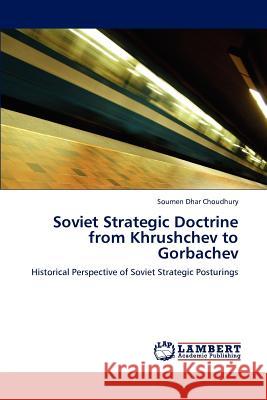Soviet Strategic Doctrine from Khrushchev to Gorbachev » książka
Soviet Strategic Doctrine from Khrushchev to Gorbachev
ISBN-13: 9783659168352 / Angielski / Miękka / 2012 / 408 str.
Tracing the development of Soviet strategic doctrine over a span of seventy years, from the Frunze-Trotsky debate to the Gorbachev era, the author draws on the available resources to vividly narrate the Soviet security policy. The focus of the book is the main emphasis of the post-war period when there was a marked tension between the Party and the military, especially during the period from Khrushchev to Brezhnev. The author assesses the restructuring of the strategic regime during the Gorbachev period to show the moral pressure put on the West by the moral posturing of the Soviets beginning from late 1980s. The different institutional mechanism and procedures at the disposal of the Party and the Soviet Government have been comprehensively analyzed. The book provides a cogent analysis of the superpower rivalry in the arms race during the Cold War period and its concurrent economic strain on Soviet Union which will be a useful input for strategic studies.
Tracing the development of Soviet strategic doctrine over a span of seventy years, from the Frunze-Trotsky debate to the Gorbachev era, the author draws on the available resources to vividly narrate the Soviet security policy. The focus of the book is the main emphasis of the post-war period when there was a marked tension between the Party and the military, especially during the period from Khrushchev to Brezhnev. The author assesses the restructuring of the strategic regime during the Gorbachev period to show the moral pressure put on the West by the moral posturing of the Soviets beginning from late 1980s. The different institutional mechanism and procedures at the disposal of the Party and the Soviet Government have been comprehensively analyzed. The book provides a cogent analysis of the superpower rivalry in the arms race during the Cold War period and its concurrent economic strain on Soviet Union which will be a useful input for strategic studies.











